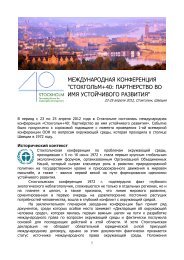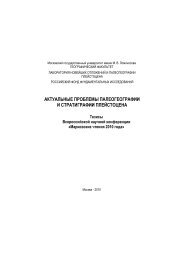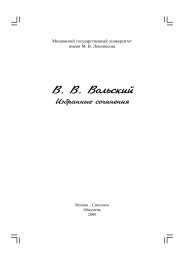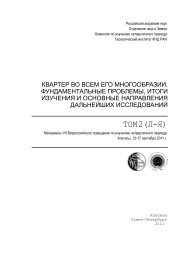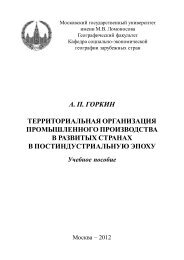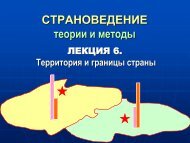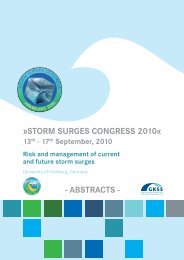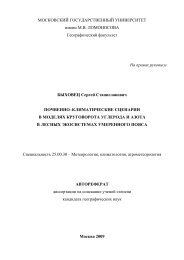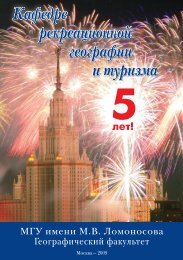Permafrost
Permafrost
Permafrost
You also want an ePaper? Increase the reach of your titles
YUMPU automatically turns print PDFs into web optimized ePapers that Google loves.
Electrical Conductivity of Rocks in Freezing-thawing Cycle<br />
Vill S. Yakupov and Mansur V. Yakupov<br />
(Institute of space physic and aeronomy SD RAS, Yakutsk, Russia)<br />
Abstract: Let us consider rocks electrical conductivity in a freezing-thawing cycle. A quantity<br />
of unfrozen water in them is supposed to be less than that of a percolation treshold.<br />
1. Rocks are saturated by fresh water and do not change after freezing-thawing cycle.<br />
1.1. A specimen of a rock to be slowly cooled from one side till some –t. At t=0 0 C free water<br />
usually falls in a metastable state and only after some delay begins to freeze. From this moment<br />
conductivity of rock is decreasing. Temperature of the rock returnes to 0 0 C and till freezing<br />
almost all the free water remains constant. Farther the bound water begins to freeze. On this<br />
stage temperature and conductivity of the rock decrease, last one in a small degree, depending<br />
from temperature and specific quantity of the bound water.<br />
1.2. When thawing this rock its conductivity will rise up exactly the same way down when<br />
freezing except a stage of a metastable state of water which takes no place.<br />
2. A rock, saturated by fresh water, changes after freezing-thawing: owing to brittle fracturing<br />
of rock, coagulation or to ice inclusions formation in case of deposits. These processes change a<br />
pore volume, a pore space structure and decrease a part of the bound water in rocks.<br />
2.1.A change of a conductivity when rock is cooling will be the same as in p. 1.1. but final<br />
meaning of conductivity after the completion of the freezing process will be less and its<br />
decreasement on the stage of the bound water freezing will be more.<br />
2.2. The curve of the rocks conductivity change during its thawing will repeat one when<br />
freezing except a stage of the metastable state of free water which takes no place.<br />
Conductivity of fully thawed rocks depend from a change of their tortuosity in a<br />
freezing-thawing cycle. If this change will be small the final meaning of thawed rocks<br />
conductivity will be less owing to decreasing of a surface conductivity contribution.<br />
3. Rocks are saturated by saline water.<br />
Specimen of a rock is to be cooled slowly, as before, from one side. A rock porous water in<br />
the rear of the frost boundary becomes freshened, because last one drives admixtures before it.<br />
If final temperature of the cooling will be higher than eutectic one, in the base of a specimen<br />
will be formed an unfrozen layer saturated by saline water. If final temperature of the cooling<br />
will be below than eutectic one, in the base of a specimen will be formed a layer with porous<br />
space filled by eutectic. Conductivity of it will be almost the same as above it because crystals<br />
of salts are dielectric. In real conditions a change of rocks in a freezing-thawing cycle will be<br />
asymmetric owing to a change of rocks volume and its pore space structure.<br />
Key words: Electrical conductivity, rocks, freezing-thawing cycle<br />
63



